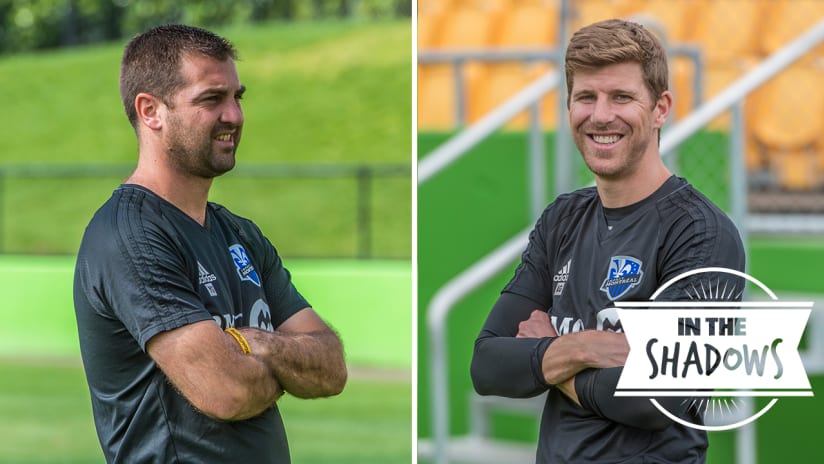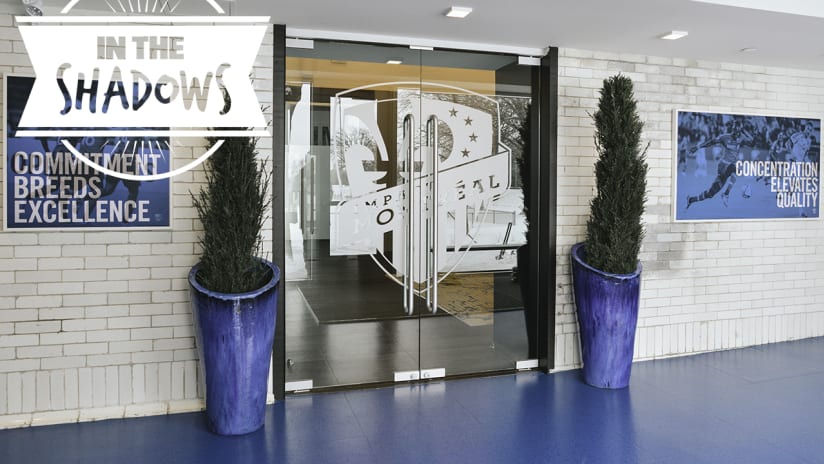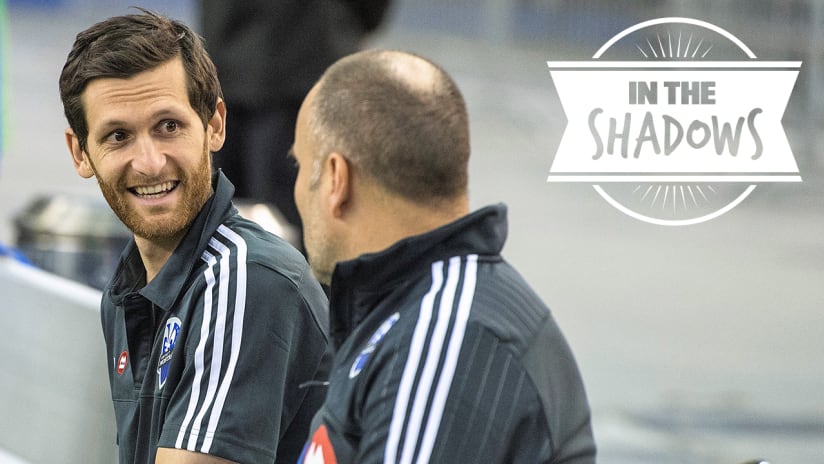Impact Media sits with Yannick Girard, fitness coach, and Antoine Guldner, mental strength coach
Behind the badge is a heart, to pump the blood. Under the sometimes extravagant hair is a brain, to control, analyze and decide. And above the boots is a bunch of muscles, to run, jump, shoot, pass… For players to be in the best possible shape during games, there is, obviously, work during training sessions, but also nutrition, rest, mindset and many other physical, mental and social factors. Impact Media met with Yannick Girard, fitness coach, and Antoine Guldner, mental strength coach, to talk about the vital work they do with the first team.
Training camp is a crucial moment to get back to the level
YG: During preseason, the number one challenge is to put the players in their best physical shape for the first game. We wish to have a good start to the season, just like last year. To achieve this, we took the decision to have a progressive preseason, so that everyone is at 100% for the first game. We want to be good from the start, to be competitive and to win points.
AG: Collectively, the objective is to explain once again who we are, what we want to do together and how we want to do it. The preseason work consists in answering these questions. Which values do we share and what type of soccer do we want to implement?
It’s about creating links between players and developing automatisms on the field. On the individual front, we watch and we discuss with the players to know how they are feeling. Coaches give as much information and advice as possible to players for them to focus on what they can control (their preparation and their performances).
Preparing to achieve collective and individual objectives
YG: In preseason, we are mostly collective; we start from point A with everyone to bring the group to point B. We know the workload will be different depending on positions on the field. After that, during the season, we will start to get a little more into the position, notably for the players on the wings, who run up and down the field more often. For a centre back, for instance, it does not really matter if he covers less ground during training. A striker will need a repetition of sprints; if he does not run 15 kilometres during training or during a game, it does not bother me, it is not what is needed in his position.
During the same 10-minute exercise, players will have completely different workloads. Physical shape does not come necessarily from physical preparation; we integrate it to our exercises during training. I make my physical demands to the coaches and we create our exercises according to the session’s objectives, whether they are technical, tactical or physical.
AG: It’s important that the coaching staff and players be on the same page. At the end of the day, the exercises put in place and the communication allows players to understand what is asked of them and what they have to do on the field. It is also very important that they want to do it, that they feel it can be efficient, that it can make them progress individually and bring them success as a team.
Managing different cultures in the squad
AG: If we have common objectives and values, we have better chances, whatever our differences might be, to go forward in the right direction.
It is important to value respect within the technical staff and in interactions with players. We have to be aware that, yes, there can be differences, but if we are able to respect these differences and, each of us, make efforts to get on well together, we can reach high performance levels.
YG: We try to know players as much as we can; it’s more than a coach-player relationship, it is almost a friendly relationship. We know our approach will be different with an American than with an Argentinian or French player. It is not easy at first, but later, I think it is positive and something to cherish, all these cultures. We can take away something from everyone’s experiences. I retrieve all this different data coming from all around the world and I think about what I can add to it. Players bring products from all over, so to speak. Now, how can we mix this soup to make it good and to create something that will be interesting for the whole group?
Training body and mind
AG: The challenge for players is effectively to be able to focus and to stay focused for the duration of the game, despite fatigue and emotions. Coaches put in place more and more complex exercises on the field and Yannick regularly adds cognitive constraints to train players to think and to make decisions when they are stressed and fatigued.
We also try to recreate game conditions as much as possible during the training week. Players are trained to repeat high-intensity efforts; the physical preparation is often done with a ball and by integrating a tactical component. Working all week in this manner, with complexity and by being as close as possible to game conditions, helps players be better prepared.
Staying on top for nine months
YG: The season is endless. In 2016, we had the longest season in Impact history. I think MLS has the longest season of all leagues in the world. Adapting to that is near impossible. We have to manage it from a physical standpoint. We don’t give ourselves too many challenges during intense periods of three games in a week. We start on five-week cycles. We prepare for the first cycle and then, we see how we can adapt for the next one. Honestly, it is impossible to plan ahead for the whole season, in order to be on top for the whole schedule. Injuries occur, suspension enter the fold, a lot of things happen and we need to adapt.
AG: The regular season is indeed very long and we must remember the importance of each game. It is interesting to know the long-term objectives, but also, and mostly, to focus on the road to travel to get there. Players always have a visual of the upcoming short-term series of games awaiting them and coaches work weekly with the same intensity to prepare the next match.
We have to be aware that at the highest level, it is normal to have difficult moments in a game and in a season. The best teams are the ones who are able to stay together and focused in these difficult moments to overcome them and find success again.
Importance of mental health in physical fitness
YG: Antoine has an outside eye, while I am more inside the group. He stays back, so his assessment is a bit different than mine, as I am surrounded by the players. His impact on my work is that he can guide me daily. He tells me: “We experienced this or that in the last three days, I would like you to go towards this mental aspect. I would like players to have a bit more fun,” whether it is because of a loss or of a harder training session.
If we want physical freshness from our players, they also need to be fresh in their minds. Antoine will tell me to put together an enjoyable warm-up session, a speed exercise where players will have fun and challenge each other a bit. He helps me a lot in my work, by guiding me in my exercise creation.
The “character” cliché
AG: Character and determination are often natural with high-level players, but it can also be learnt and developed. Character and determination are forged with experience and repetition. A player who is aware of the importance of determination can develop a taste for it. The players can also develop a taste for winning and learn to hate losing. A player who gets into a habit of being demanding of himself will discover the advantages he takes away from that and will find a lot of motivation. We have the chance to have a lot of experienced players who have this mindset and who want to help young players develop their determination and their sense of responsibility.





